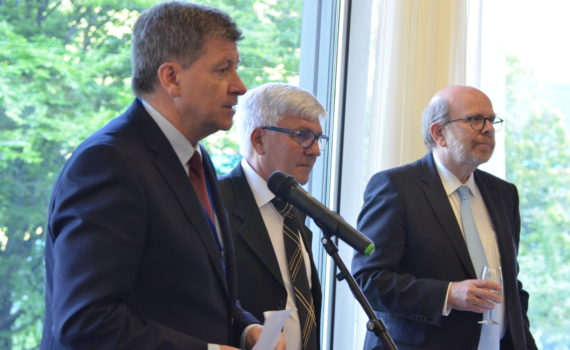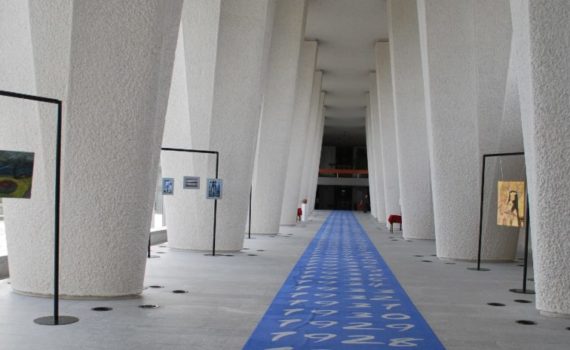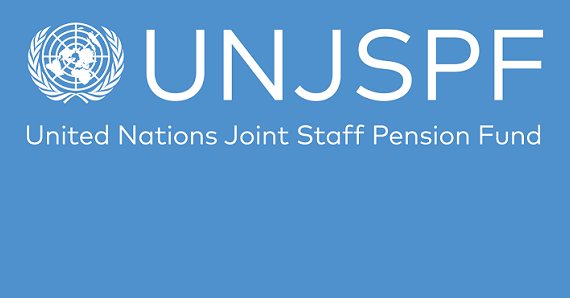
Photos of May 2018 reception of former officials
Category : Archives
The photos of May 2018 reception of former officials are online! Thank you to the photograph, our colleague Jacques Rodriguez.

Category : Archives
The photos of May 2018 reception of former officials are online! Thank you to the photograph, our colleague Jacques Rodriguez.

Category : Archives
On Thursday, May 17, 2018 in the late afternoon was held the spring reception of retirees of the ILO at the invitation of Guy Ryder, Director General. Many colleagues had responded, as usual, to this invitation a few days before the start of the 2018 International Labor Conference. The Director-General honored the reception with his presence and had the opportunity to greet many former retired colleagues.
Mark Levin, Director of HRD, greeted the retirees present and gave the floor to Mr. François Kientzler, Executive Secretary of the ILO Elders Section. In his speech, he mentioned a recent ILO Seminar on “How to age well”, which brought together some 200 ILO retirees and other international organizations in Geneva. In particular, this Seminar benefited from the expertise of former WHO retired medical officers. All of the work will be published and available to everyone, including on the Alumni Section website. He then referred to the ILO’s centenary by thanking all those who had already given a testimony about a notorious event they had experienced. This information will be shared with the ILO Communication Service (DCOMM). Two working meetings have already been held at the beginning of the year with the ILO officials responsible for coordinating the Centenary events and the Section of Elders is fully integrated into the process. It will keep retirees informed of any events affecting them.
In his intervention, the Director-General recalled that the general objective of the ILO Centennial was to look to the future and, in particular, to future employment and work. He recalled that the ILO has constantly adapted to the often profound changes in the world of work and that the retirees present have been actors. It is now up to the ILO to look to the future and adapt its resources to the new demands of the profound changes in technologies that change labor relations. But without forgetting all those who are outside these transformations in developed and developing countries. On the occasion of the ILO Centenary in 2019, many events will be held in Geneva and around the world, including a meeting of a United Nations and Swiss Federal Government forum. Regarding the requirements to which the ILO itself is subject, it quoted the duration of the International Labor Conference, which is only two weeks long whereas in the past it lasted up to five weeks. He also mentioned a recent staff strike at the March Board meeting, recalling that this is part of the life and working relationships of any company, so it can happen even at the ILO. In conclusion, he thanked all present for their continued interest in the future of the ILO.
The reception was an opportunity to exchange with friends but also, for many of us, to make new acquaintances. For the members of the Bureau of the Alumni Section this was an opportunity to meet and talk with many retirees. It is also our responsibility to mention the participation of several DCOMM officials in this reception who were able to interact directly with ILO retirees in preparation for the ILO Centenary.
Note:
The next reception will take place on Thursday 13th December 2018

Category : Archives
We are fast approaching the 100th anniversary of the International Labour Organization in 2019, and it promises to be a landmark year. Hundreds of events, both here in Geneva and globally, are planned to mark the occasion, which we hope will have wide coverage in the media.
For decades, ILO retirees have made their contribution to the ILO by participating in the implementation of its goals throughout the world. In our circular letter of 30 January 2018, we asked you to contribute by recalling moments in this history, and many of you have already answered the call. Some of these recollections feature in 63th issue of Message and others will be published later; all contributions will be put on our website (anciens-bit-ilo.org). As noted in the circular, we will also transmit your responses to the ILO’s Department of Communication, which will be able to integrate them into specific communication topics.
Mention of this topic affords me the opportunity to tell you that we are working closely with various branches of the ILO in connection with the preparation of events for the Centenary, and Director General Guy Ryder has expressed the wish that former officials, who shaped the Organization, should be fully involved. We are delighted to have already had two meetings in the first half of the year with the ILO officials in charge of the Centenary. Although we cannot give you a precise date at the moment, a milestone event will be held for retirees which will be attended by the Director General. We submitted a number of suggestions that have been adapted and integrated into the general programme of planned events. As soon as the timetable has been finalized, you will all be informed, especially those of you who reside some distance away.
This start of year has been an intensely busy one for the Former Officials Section. In addition to our regular activities, 14 May saw us holding a seminar in collaboration with other international organization retirees, which brought together some 200 participants on the theme “Stay younger for longer”. We hope you will all be able to benefit from the results of this event, which we will be posting on our website as well as sharing via mail. The spring reception held on 17 May in the presence of the Director General was the usual resounding success.
This spring, the SHIF sent out new amendments to the Regulations and Administrative Rules that take into account some of the long-standing demands of retirees. Be especially aware of the codes set out towards the end of the Schedule of Benefits, which incorporate coverage of new procedures such as vaccinations, preventive screenings and alternative medicines.
Let me conclude by drawing your attention to recent action taken by the Staff Union, including the staff coming out on strike to defend the status of the international civil service after the recommendation of the ICSC (International Civil Service Commission) to slash salaries in Geneva, and the ILO Governing Body’s decision to implement it.

Category : Archives
Four representatives from the Pension Fund, including the Deputy CEO Paul Dooley and the new RSG Sudhir Rajkumar, briefed Pension Committee representatives of the participating organizations in Geneva (including staff and retiree representatives) on 4 June 2018.
The message was broadly positive although there were also notes of caution concerning the active to retiree ratio (from 3.12 to 1.6 in 2017) and the US $ 300 million excess in 2017 of benefit payments over pension contributions received. This places even greater importance on investment returns to maintain the health of the Fund.
Human resources
The human resources situation is certainly mixed as the CEO Sergio Arvizu has been on long-term sick leave since August 2017 and is unlikely to attend the next Pension Board meeting at the end of July. The Deputy CEO is retiring from his post at the end of August 2018 (the candidate to replace him should be presented to the Pension Board at the end of July) and the Chief Communications Officer is also leaving at the end of June 2018. On a more positive note the Secretariat of the Pension Fund was granted 4 additional posts last year and all (previously) vacant senior staff positions were filled.
The new RSG responsible for investments, Sudhir Rajkumar, started in January 2018. He has 29 years of broad-based global investment experience with the World Bank and the International Finance Corporation and immediately prior to becoming RSG was head of the pensions investment advisory programme at the World Bank Treasury. Despite identifying in his first few months in office a need for additional staff to deal with the increasingly complex and challenging investment environment the number of posts in the investment division is fixed until 31 December 2019.
Operational issues
Mr. Dooley reported that in recent years the Fund has introduced a number of improvements in client services: call centre, member self-service, liaison office in Nairobi, expanded outreach activities and a new web site. An office in Bangkok, similar to that in Nairobi, is also being considered.
Currently the Fund is processing 80% of all claims within a month of receiving them (the median processing time for new claims is 12 working days) and 80% of emails are handled within 15 working days. The aim is to process 75% of all claims within 15 working days so there is still some way to go to achieving the target. He mentioned that the Fund is keen for more retirees to avail themselves of the self-service function and will be conducting an information campaign to encourage people to use the system, which is intended to improve the Fund’s ability to provide a better service to all its members.
Financial health of the Fund
The Fund currently serves 205,000 members: 127,000 participants and 78,000 retirees. The number of retirees is growing faster than active participants (increased by 86% since 1998 as opposed to 76% growth in active participants) and as already mentioned, the payments annually exceed contributions. For the Fund to remain sustainable it must achieve an annual real rate of return (i.e. net of inflation) of 3.5%, which historically it has done except in the last 10 years due to the 2008 financial crisis. The good news is that the investment return in 2017 was a healthy 16.5% – well exceeding the target – but the RSG noted that markets have been volatile in 2018 and there are always peaks and troughs in the returns on financial investments so it is important to be vigilant and certainly not be complacent. He reported, however, that the value of the Fund had remained stable since the beginning of 2018 and as of 31 March 2018 stood at US $ 64.2 billion.
What to watch for the future
More information about the senior staff, and operational and financial status of the Pension Fund is available in the most recent UNJSPF newsletter: https://spark.adobe.com/page/QYMPhPeAGRclH/

Category : Archives
From the Executive Secretary of the Bureau of the Former Officials Section
Dear friends,
None of us these days can say that the years go by like a smooth stretch of highway. That may have been the case a few decades back, when the future of the planet seemed rosier than it does today. International organizations now face all sorts of constraints and pressures both from their constituents and from politicians. The watchwords now are effectiveness, efficiency, cost reduction, performance improvement, outcomes. And the ILO is not immune.
One of our constant concerns is the operation and maintenance of the health fund (SHIF). This is a subject that features on the agenda of every fortnightly meeting of our Bureau. There is much to worry about, like the risk that the administration of benefits may be outsourced, or that retirees may be transferred to national social protection schemes – even though we are all too aware how many countries do not even have one. We are committed to improving the governance and management of our fund; probably by the time you read this editorial you will have been informed via the SHIF Newsletter of the improvements in progress.
The United Nations Joint Staff Pension Fund is also experiencing turbulence, not just for financial or efficiency reasons but rather because of internal problems that do little to foster a calm working climate. The UNJSPF has introduced a new integrated IT system and in many cases new pensioners had to wait months before their first payment. (We should mention that payments to existing retirees have not been affected.)
The Bureau of the Former Officials Section has continued its activity of bringing people together and communicating with retired staff. The section’s website (http://www.anciens-bit-ilo.org) is regularly updated to provide information that concerns you directly as well as about the ILO and its staff’s concerns and interests, which often coincide with those of retirees. We are investing a lot of time to keep the site lively and up to date. But that does not mean neglecting your favourite publication Message, which also takes work and effort. Thanks are due to our contributors; we are always looking for volunteers to help with translations or proofreading, or to write articles and background material.
This spring, the Bureau of the Former Officials Section met the Director General, Mr Guy Ryder. Our report features both in this issue and on the website. I mention this meeting because it indicates recognition of the position of retired staff within the Organization, and we thank the management for that. The two annual receptions held at the invitation of the DG are also a clear sign of appreciation for those who wrote the history of the ILO. This is why the Organization’s Centenary in 2019 will be a year when retirees must be present. We have some projects that have already been raised at the meeting with the DG but now we have to enter into a more pragmatic approach together with the management.
The Bureau of the Former Officials Section participates in the annual Pre-retirement Seminar and we take the opportunity it offers to establish personalized contacts. We work with the retiree associations of other international organizations in Geneva, including the ITU, the UN and the WHO. We are currently preparing a joint seminar on the theme on “Stay younger for longer”. This half-day event is aimed at those residing in the Geneva region, but you will all be kept informed of the results.
The Section re-elected its Bureau at the end of 2017. We thank those who have joined the Section and who voted; but it is never too late to join us even if you have been retired for many years. The more of us there are, the stronger we will be to defend your interests.
François Kientzler
Executive Secretary
Bureau of the Former Officials Section

Category : Archives
The next year, 2019, marks the Centenary of the ILO. The Section of Former Officials would like to participate in the actions and events for the Centenary celebrations and therefore I am writing to ask for your help to make the celebrations truly memorable. More information about specific plans will be sent to you later as well as being posted on the Section’s website. The Section has met with the ILO’s Centenary Project Coordinator and our proposed activities are intended to be incorporated into the ILO’s master plan!
With the support and encouragement of the ILO, we are now contacting you to seek your input by way of memories, anecdotes, photos etc. that you may have of important conferences, events, occasions, or people that have shaped or contributed to the organization and its achievements. Any text you might wish to contribute need only be a half to one page of A4 as they are initially intended as “snapshots” although we may ask for some to be developed further as necessary.
Depending on the context and other activities taking place, these texts and/or photos may be used in a special edition of our periodical Message, used by the ILO in one of two books that are being written to mark the occasion or to illustrate other ILO Centenary events and activities.
In order to be sure such contributions can be incorporated we would need to receive them by the end of June 2018. Please send your contributions by email or by post.
Please do not hesitate to contact the Section if you would like more information or have any suggestions on how you can participate in the Section’s activities to mark the Centenary. We need volunteers so please get writing!

Category : Archives
RETIRED FORMER OFFICIALS
Retirees may access the ILO building on presentation of their Staff Health Insurance Fund (SHIF) insurance card together with a photo identity document such as a carte de legitimation, driving licence, passport etc. Retirees who wish to access the ILO building regularly but do not have an ILO badge may apply for one by email to accreditations@ilo.org.
FAMILY MEMBERS OF RETIRED FORMER OFFICIALS
The ILO does not provide badges to family members. However, family members may access the ILO building on presentation of their Staff Health Insurance Fund (SHIF) insurance card together with a photo identity document such as a carte de legitimation, driving licence, passport etc. Family members who do not have a SHIF card (or who have only the SHIF card for the retired member) but who need to access the ILO building should go to the R2 security desk who will then contact the Control Centre to authorize entry on each visit.

Category : Archives
Documents
Audio recording
A seminar on “How to age well – Stay younger for longer” was held on 14 May in the ILO Council Room. Organized by the ILO Alumni Section in collaboration with the former staff of the WHO, United Nations and ITU, it brought together about 200 participants. An inter-organization working group met on several occasions for its preparation. Representatives of the Alumni Section were Kitty Hooton, Liz Sommaro, Abdoulaye Diallo and François Kientzler.
After a presentation on the main normal and pathological consequences of aging on mental health, it was followed by several interventions of member associations of the Geneva Seniors’ Platform, Pro Senectute, Geneva Red Cross, the Geneva institution of maintenance at home (IMAD) and Cité Seniors on the Swiss side and the local gerontological information and coordination center (CLIC) of Pays de Gex on the French side, all followed by questions and comments from the participants.
The focus of the seminar was on living better rather than on the negative aspects of aging; In this connection, the three pillars of aging well were recalled: eating well, training one’s body and maintaining one’s mind. The choice of the speakers was also thought to strengthen the anchoring of our associations in the local environment, thus benefiting all the old ones.
The seminar concluded with the message of hope from Bonnie Fatio, Founder of AgeEsteem, “Aging with passion! “. Bonnie reminded us that, according to a study by Yale University, people who have a positive attitude towards their age live on average seven years and six months longer than others.
We hope that the results of this seminar will have a positive effect on the understanding of the specific needs of elderly pensioners, particularly in the area of prevention for our respective health insurance funds. A detailed account of the work is being prepared thanks to the availability of Holger Postulart who accepted to be the rapporteur, taking notes and going to use the documents made available by the speakers and interpreters. All the people who intervened in this Seminar did it voluntarily and we thank them for it.
The working documents will be put on our website and accessible to all public as well as the report thereafter.
This seminar was the result of a sustained collaboration of several months between associations of retirees of Geneva International Organizations working in synergy. The previous seminar – on isolation – went back to October 2014. We believe that such actions are a new demonstration of the usefulness of associations and groups of pensioners, and even if you have already retired for many years, no feel free to join the Alumni Section to give us your contribution and support.

Category : Archives
The photos of December 2017 reception of former officials are online! Thank you to the photograph, our colleague Jacques Rodriguez.

Category : Archives
The meeting of the Joint Committee of the Fund took place on 24-28 July 2017. This meeting was eagerly awaited given the turmoil experienced by the Pension Fund over the past two years. Some of the problems were related to the introduction of a new computer system that initially resulted in delays of up to 6 months in the calculation of pensions for new retirees. The delays have been reduced and it now takes between 4 and 6 weeks for the first payment to be made if all the required documents are received by the Fund. It should be noted that the payment of pensions for current beneficiaries never experienced any delays. One of the biggest problems, however, concerns the calculation of survivor pensions as the new computer system does not have the possibility to include the spouse’s name on the Certificate of Entitlement – an omission which certainly does not help survivors to be paid quickly. A task force has now been set up to ensure that survivors can be paid within 4 to 6 weeks, but delays can unfortunately often occur because documents, for example regarding traditional marriages, are missing. A innovation introduced in the computer system is “Member self-service”, which is now fully operational for retirees. If you have difficulty entering the website check that you have a recent version of Windows Explorer or use Google Chrome.
Other problems with the Fund have been related to investment management which, according to the rules in force, is expected to produce returns of 3.5% (see article by Cherry Thompson-Senior in Issue 59-60 of Message). The Investment Officer of the Fund is directly under the authority of the Secretary General of the United Nations. The incumbent’s contract ends at the end of 2017 and the process to recruit a replacement started in the summer. It is very important that the person recruited is of the highest calibre to manage the large sums involved and it is essential for the long-term sustainability of the Fund that the benchmark of 3.5% is achieved.
Lastly, criticisms have been expressed in recent years about the governance of the Pension Fund. The management of the Fund’s CEO was called into question by some staff associations creating a somewhat tense climate and causing many worries for pensioners and their associations. Thus the mandate of the current CEO has been renewed for only three years, instead of the usual five (see the Joint Committee Conclusions published in this issue).